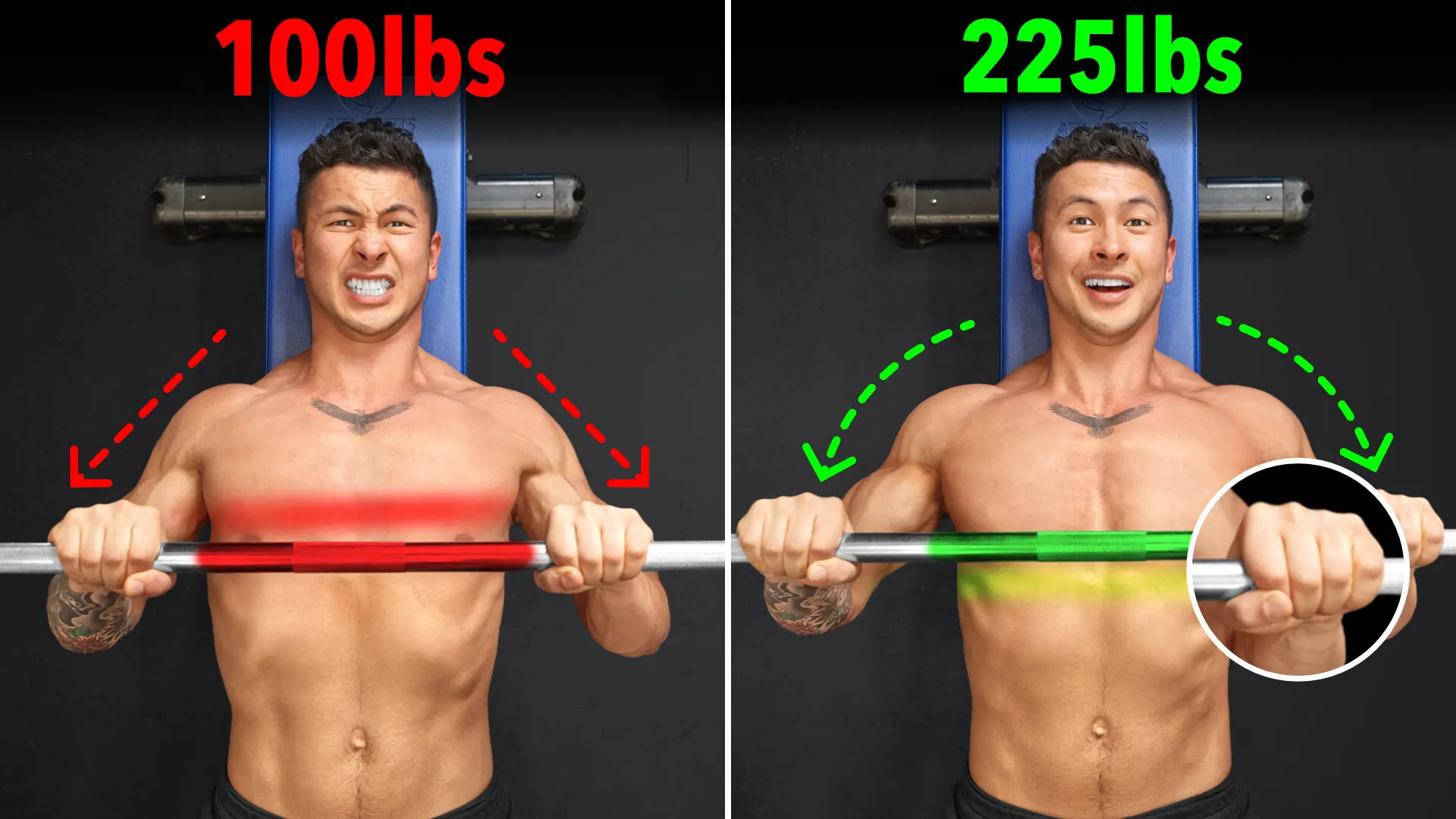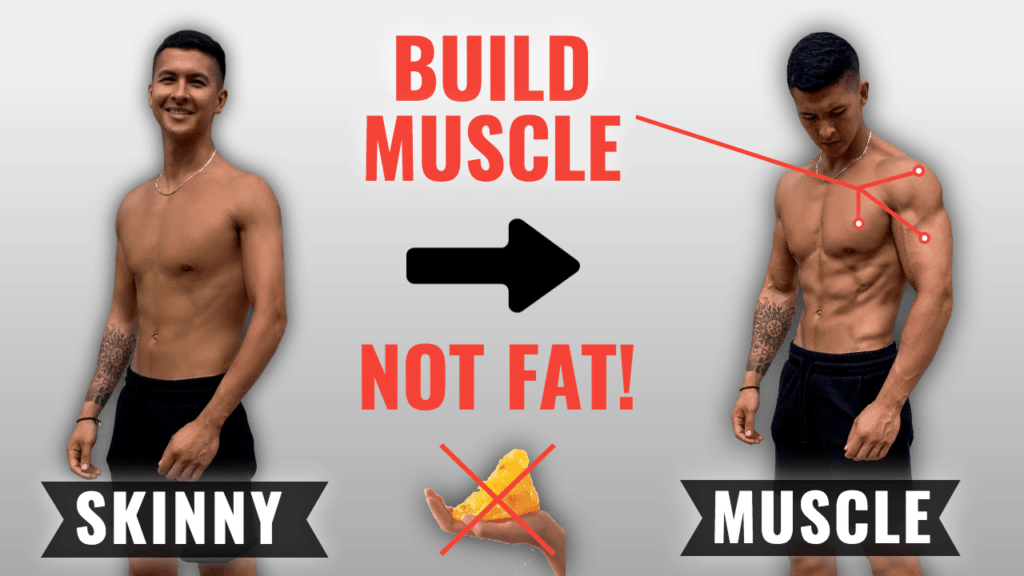
How To Bulk Up Fast Without Getting Fat (4 Mistakes To Avoid)
Looking to add size without getting soft? In this article, I cover why you're not building muscle, and more specifically, I'll go through how to bulk up fast without gaining a ton of fat in the process.
First off though, let’s cover what exactly a 'bulk' is, and why it’s ideal for building muscle.
Before that: if you're looking for a training program that'll always help you train in the most optimal approach for muscle growth, I've got just the thing for you. Every BWS program is designed to help you transform your physique in the most time-efficient manner. And best of all? It's all rooted in science. For more information on how BWS programs can help you to look better - FAST:
Click the button below to take my analysis quiz to discover the best program for you:
↓
What is 'bulking up'?
To put it simply, a 'bulk' is simply a period in which you eat at a calorie surplus in order to gain weight and add more size.
Now, it's crucial to note that bulking up is by no means required for muscle growth. That is unless building muscle is your main goal right now. Then, it is in most cases the best approach for you.
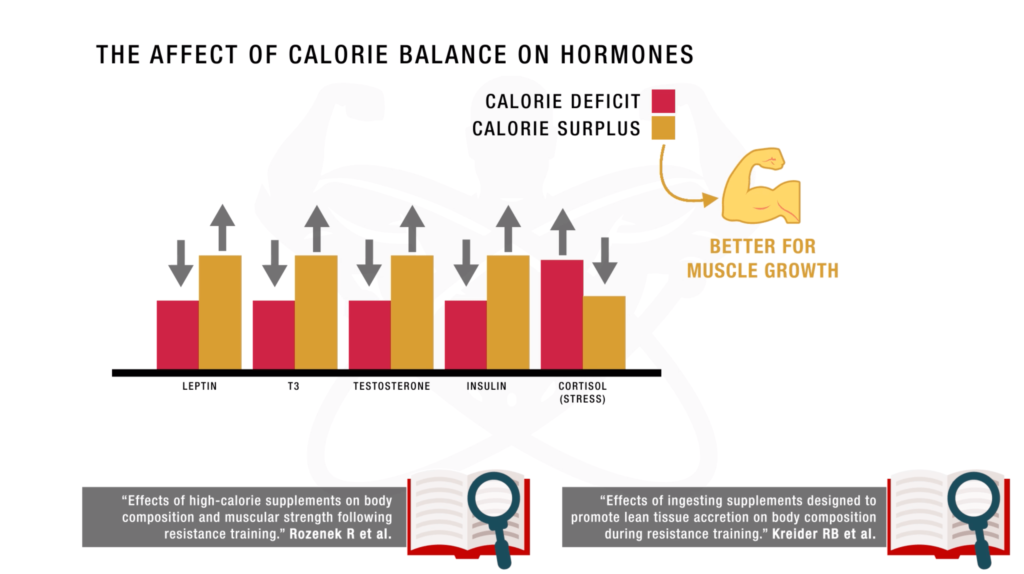
That's because we know that a positive energy balance has been shown to elicit a significantly greater anabolic effect and protein synthesis response than being at maintenance or in an energy deficit. Other studies (one from 2002, and another from 1996) show that this is especially so when you then pair it with resistance training.
Although achieving positive energy balance is in theory just as simple as eating more, most people in the process make a handful of mistakes with it. And these mistakes negatively affect the muscle-building effectiveness of a bulk.
Trust me guys, I’ve made every single mistake in the book. To prevent you from doing the same, I’ll share with you the most common ones that you’re probably making. I'll also show you what to do instead so you know how to bulk up fast. Time to build muscle while losing fat.
Mistake 1: Not Being Lean Enough
The first mistake is simply not being lean enough to fully reap the benefits of a bulk.
Why must I be lean before bulking up?
And this is problematic for two reasons.
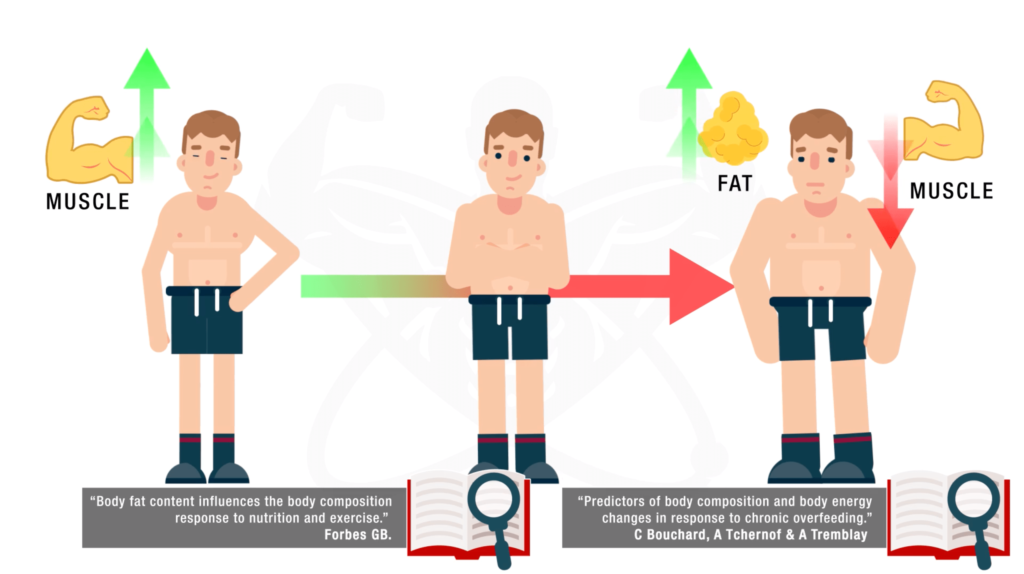
The first reason is that it’s just not optimal for muscle growth. Research has shown that as your level of body fat increases, you actually become less and less efficient at building muscle. Due to various physiological changes, you'll then build less muscle. And more fat per unit of weight gain.
Secondly, not being lean enough when you start your bulk means that you’re likely going to have to commit to a long diet. Only then will you be able to “reveal” your gains further down the road. That's because you'd need to do two things:
- Get rid of the excess fat you had initially, and
- Lose the additional fat that you put on during your bulk.
Now, this is completely doable. It's also something I’ve done in the past. But dieting, in general, is just not enjoyable.
And the shorter your dieting period is, the less likely you’ll be to call it quits halfway through the diet. If you do call it quits, however, you'll never really get rid of that excess fat that’s essentially masking your gains. In other words, you’ll be stuck in the “perma-bulk”.
How lean should you be?
Therefore, to maximize our chances of building muscle and not fat, you want to start out fairly lean. How lean? Well, ideally under roughly 15% body fat.

In the event that you’re higher than this, a much better option for you is to first diet down to get rid of that excess fat. Only then should you commit to a calorie surplus. This is just a much better approach and is the fastest way to bulk up.
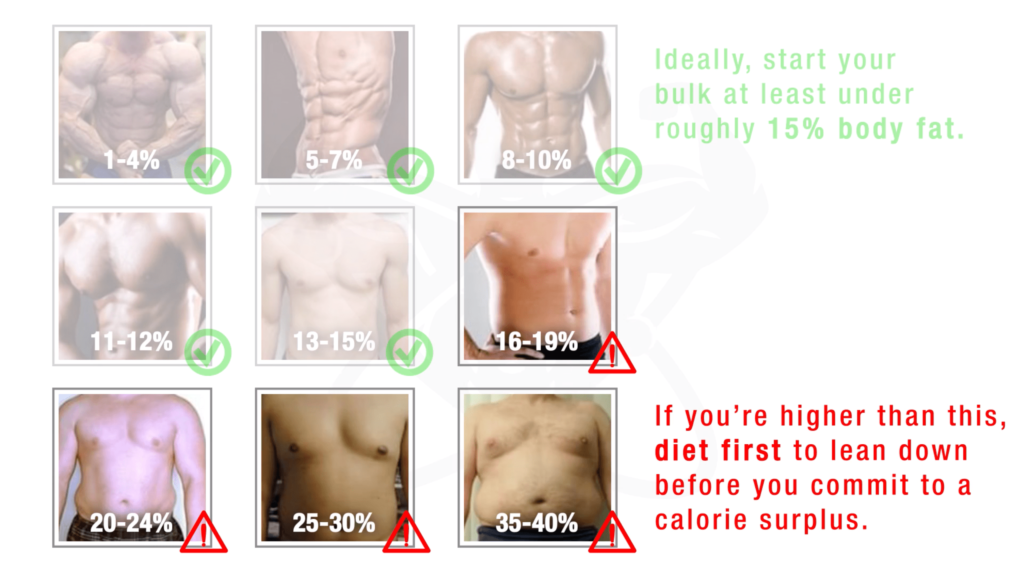
It will not only make your future bulk more effective by cutting down on the excess fat you need to shed but also because we know that the more body fat you have, the greater your ability to build muscle while losing fat in the process. So, it really is a win-win.

Mistake 2: Gaining Too Much Fat Compared To Muscle
The next mistake is gaining too much fat, in comparison to muscle mass, during your bulk. Although my previous point will help minimize this, what a lot of people believe when it comes to bulking is that the more food you just stuff yourself with, the more gains you’ll make in the process.
This is technically true. But only up to a certain point. Beyond this point, the extra food that you take in will now start to contribute significantly more to fat accumulation instead of muscle growth. And this excess fat gained is then going to take a lot of time dieting to get rid of.
Why you shouldn't crank up your calories too much, too fast
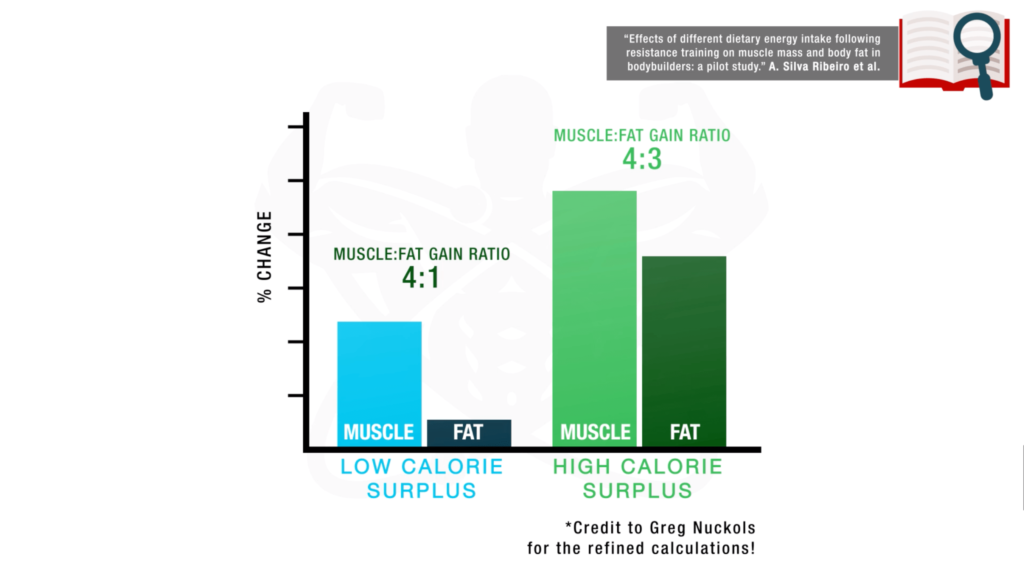
Illustrating this perfectly is a very recent 2019 paper. Researchers split lifters up into 2 bulking conditions:
- A group with a very high-calorie surplus to gain weight quickly.
- A group with a lower energy surplus to gain weight at a slower rate.
The high surplus group did end up gaining more muscle than the lower surplus group. But when you crunch the numbers, we can see that the high surplus group was actually gaining muscle versus fat mass at a 4:3 ratio. This is in stark comparison to a much more effective 4:1 ratio in the small surplus group.
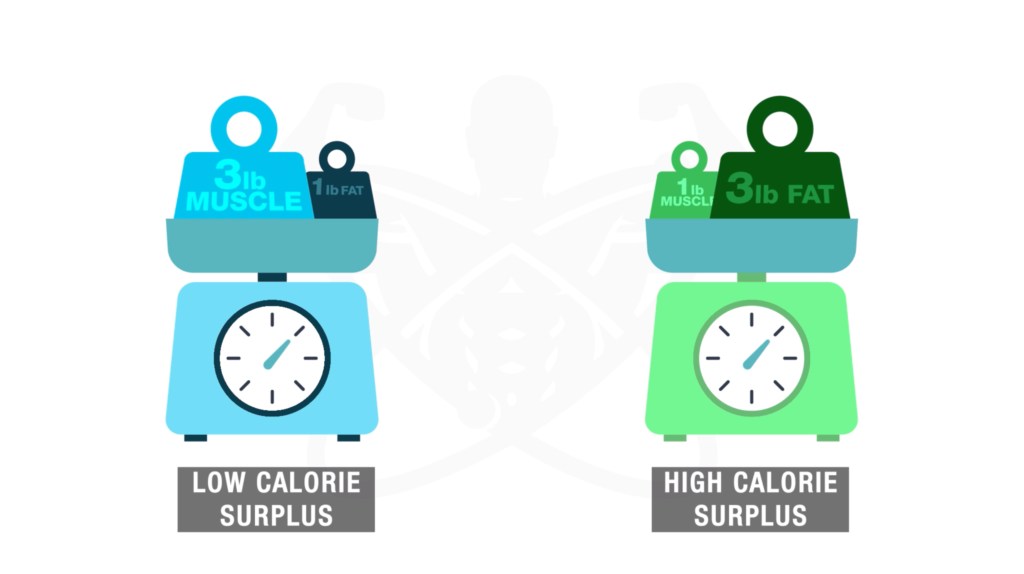
So, for example, even though the high surplus group could gain 4 lbs of weight much faster, only 1 lb of this would be muscle. The rest is fat mass. Whereas, although the small surplus group would take much longer to gain this amount of weight, 3 lbs of it would be muscle. Only 1 lb of it would be fat.
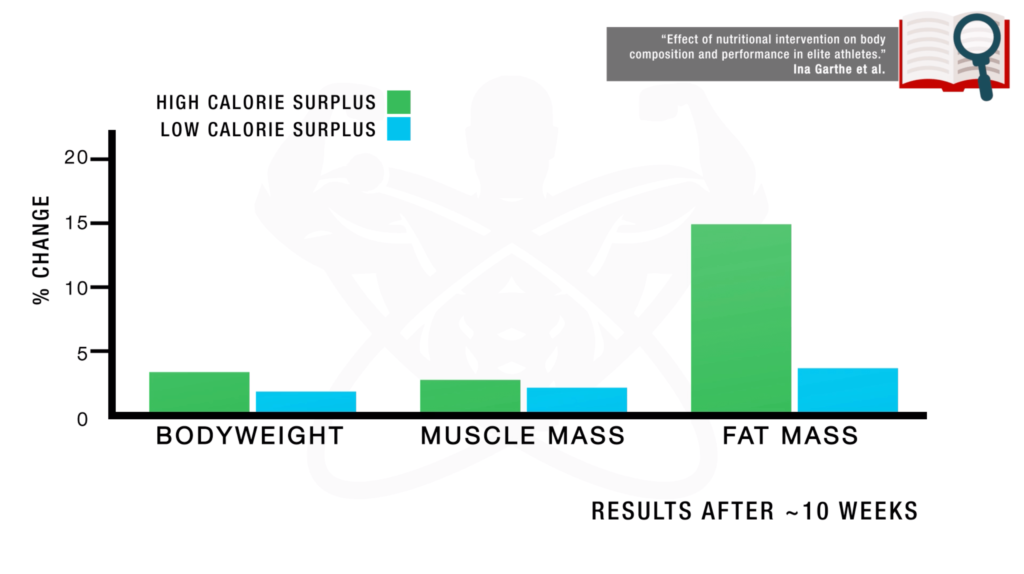
And other papers, like this 2013 study, have found similar results as well. This means that although you can technically eat more to gain more, a slower approach is going to be a lot more effective in the long run. And this is due to the more favorable muscle: fat accumulation ratio. To be honest, this is something that I’ve had to, unfortunately, learn through experience.
How to lean bulk by moderating your calorie increase
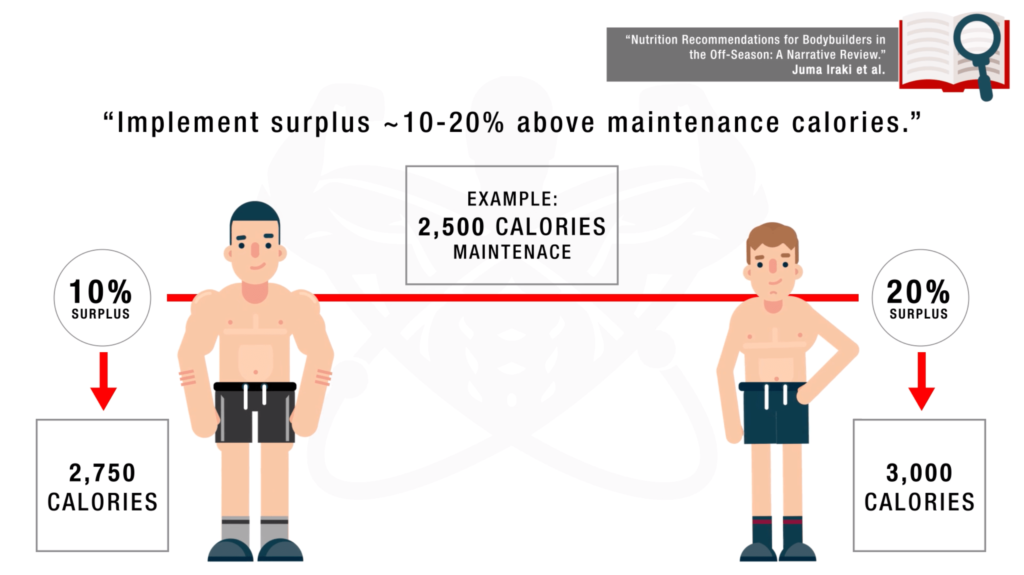
Now in terms of specifics, I’d use the recommendations of a recent 2019 Nutrition Review. You should implement a small-to-moderate surplus of around 10-20% above your maintenance calories - this is the best way to bulk up.
Beginners should be at the higher end of this, while more advanced lifters should be at the low end of this.
In addition to implementing this, you also need to avoid the mistake of not setting yourself a target rate of weight gain and tracking that over time.
Need more guidance with respect to moderating your calorie surplus? Our 3-on-1 coaching program can help. You will not only have a dietitian to customize your nutrition plan, but also a coach to focus on your training plans - plus, there's me to answer your questions every month! You'll achieve your dream physique in record-breaking time. Sounds good? Let's get started then:
Click the button below to find out more about the 3-on-1 coaching program:
↓
Mistake 3: Not Setting A Target Rate Of Weight Gain
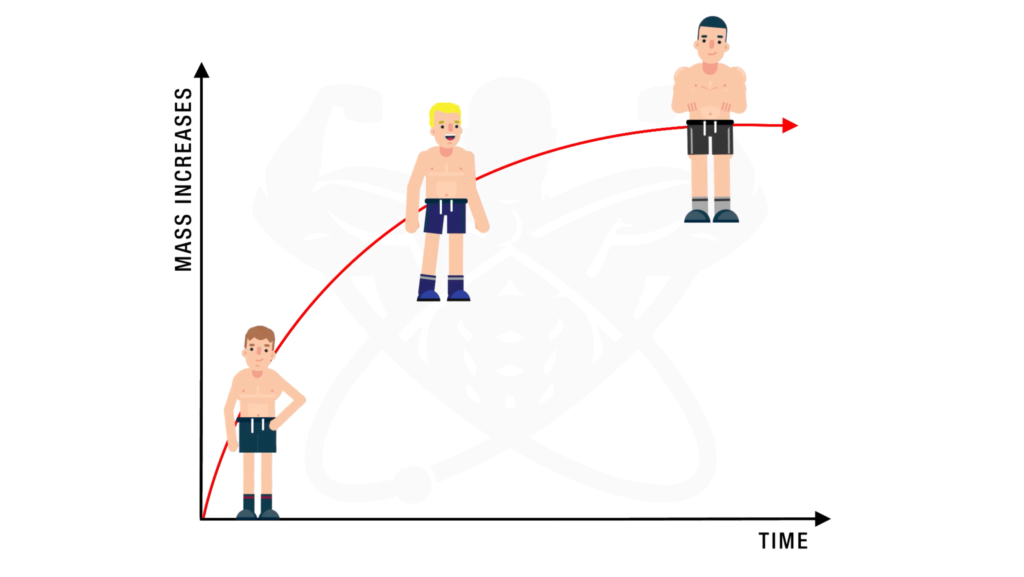
Although we just talked about how the body has an ideal rate at which it can put on new muscle, we also know that this rate slows down the longer we train. You should, therefore, be setting a goal rate of weight gain throughout your bulk. This goal rate needs to be in accordance with your training experience. And you'll then need to make sure that you’re hitting that goal.
How fast should you bulk up?
Researcher Eric Helms has done a great job of explaining how to effectively do so by using this chart shown here.
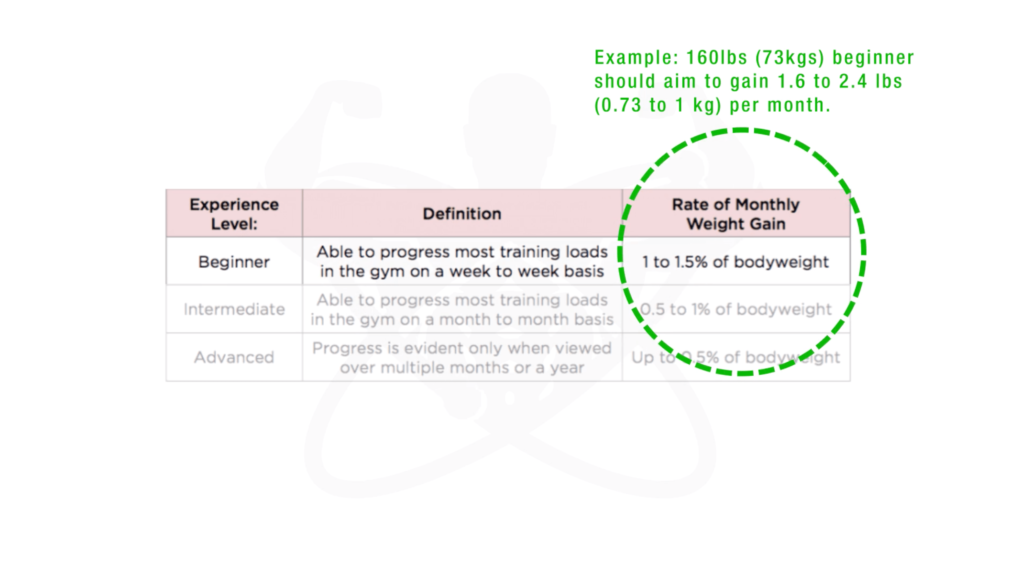
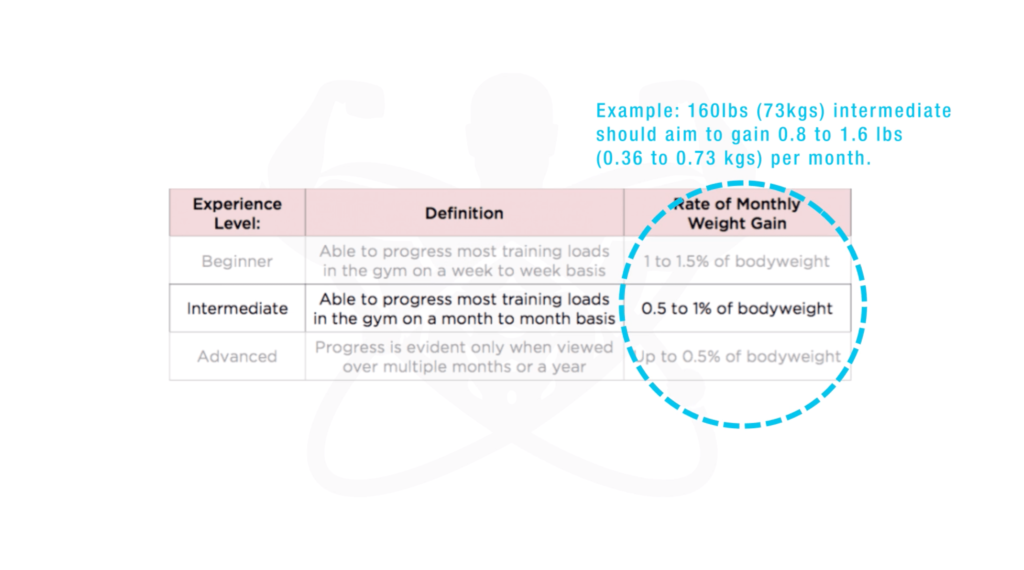
So, for example, if you're a:
- Beginner (Someone who is able to lift more weight in the gym pretty quickly) - Aim to gain around 1 to 1.5% of your bodyweight per month.
- Intermediate or advanced - Slow this down accordingly. Your body just won’t be able to put on new muscle as rapidly as you could as a beginner.
Once you've set a goal rate of monthly weight gain, monitor your weekly average weight. This helps determine if you’re indeed hitting this goal every month.
If you're:
- Undershooting your goal - Increase your calories slightly.
- Overshooting your goal - Decrease your calories slightly.
Doing this will just ensure that you’re on the right track. And you'll know that you're not either eating too much and gaining too much fat or eating too little and slowing down your muscle growth as a result.
Mistake 4: Being Impatient
Now, the last but probably most relatable mistake: not being patient enough.
Why patience is key when bulking up

So, how long does it take to bulk up? Well, unlike fat loss, building muscle is an incredibly slow process. And to make matters worse, during your bulk it’s inevitable that in addition to the muscle you gain, you’re also going to put on at least a bit of fat throughout the process.
This can basically “hide” the added muscle that you gain. It'll, therefore, visually seem as if you’re not really progressing. The lack of visible progress often then leads people to go back to dieting too soon. And, as a result, no progress will be made.
Instead, just understand that it takes several months (and even years) when you’re more advanced to put on any noticeable size. This is why it’s absolutely vital that you commit to bulking up for an extended period of time.
How to lean bulk with patience
So, you'd need at least a couple months, for example, throughout which you’re both:
- Hitting your target monthly weight increases, and
- Increasing your strength in the gym.
When your body fat approaches the upper limit I mentioned earlier or you’re satisfied with the size that you’ve added, you can then diet down to essentially “reveal” the new gains you’ve made.
But at the end of the day guys when it comes to bulking and building muscle you just need to be patient. Trust the process, and track as much data as you can along the way. This ensures that you know when you veer off track and can adjust accordingly.
And that’s exactly why within my BuiltWithScience programs, we’ve created various nutrition and workout software that basically automates this whole process for you. This enables you to essentially “shortcut” your muscle-building process. And to discover which program is best for you and your specific situation:
Click the button below to take my analysis quiz to discover the best program for you:
↓
I hope you enjoyed this article and found it useful! Don’t forget to give me a follow and connect with me on Instagram, Facebook, and Youtube as well, in order to stay up to date with my content.


